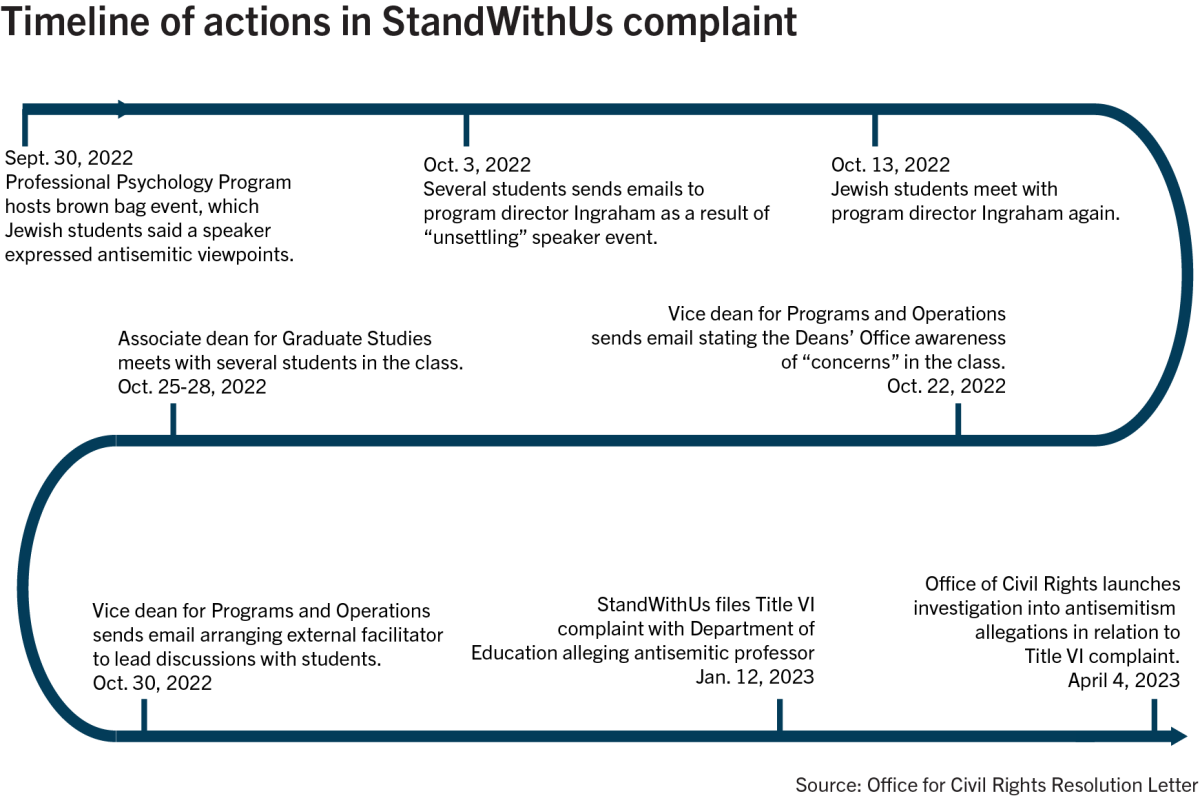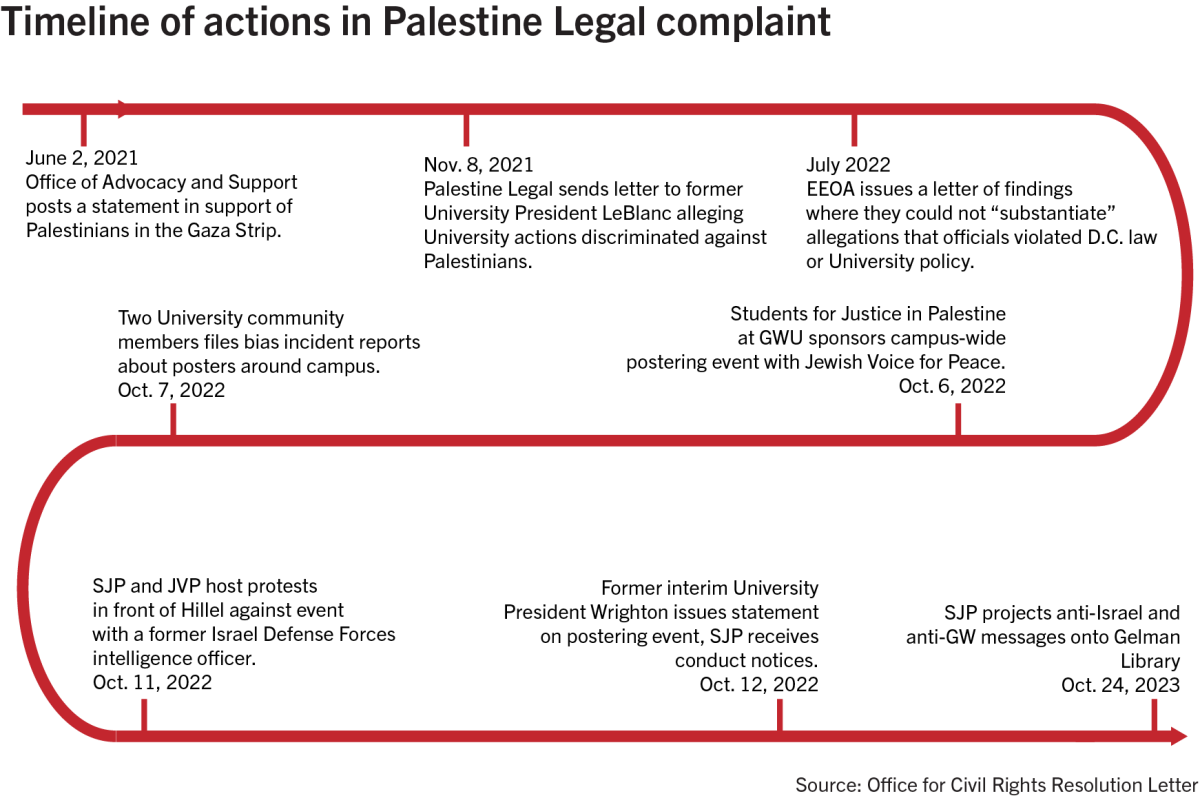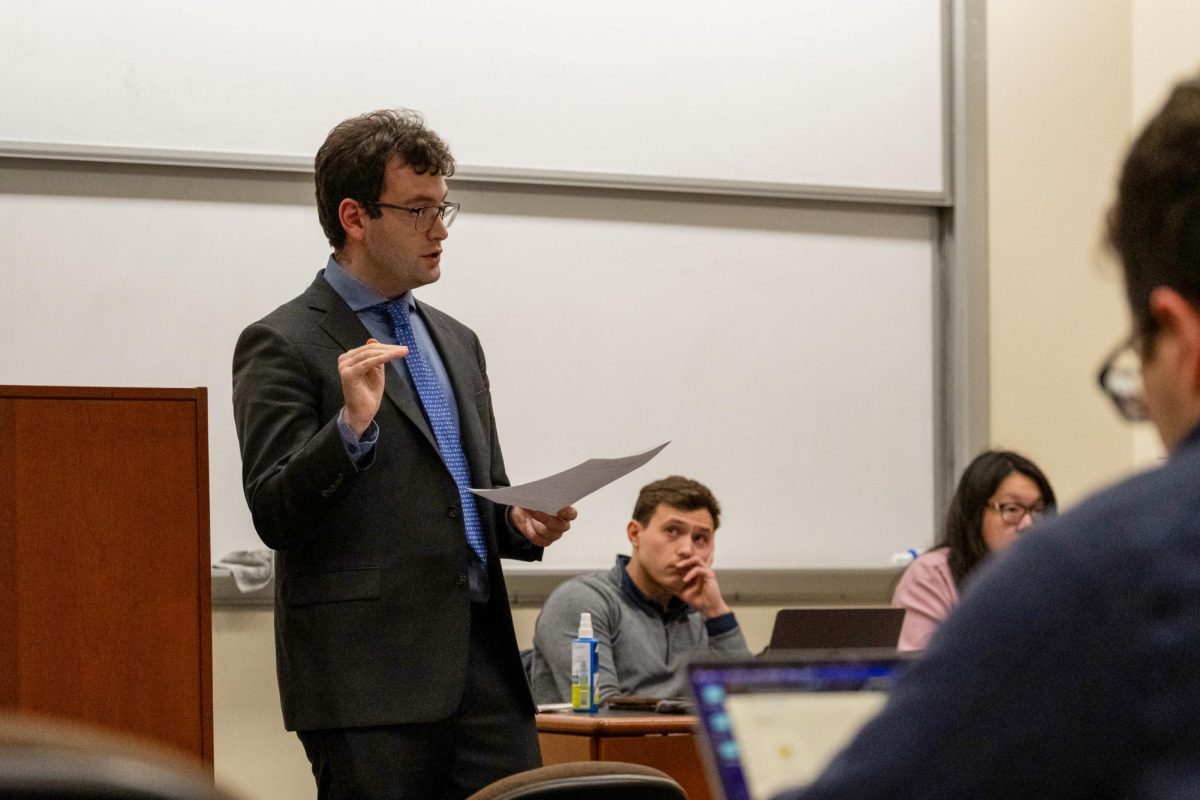The Department of Education Office for Civil Rights identified “concerns” in the University’s response to reports of discrimination and a hostile environment and unfair treatment in the student conduct process, according to a resolution agreement obtained by The Hatchet.
GW entered a resolution agreement on Jan. 16 with OCR according to the resolution letter, which was obtained via a public records request, concluding nearly two-yearlong investigations into a pair of Title VI complaints alleging anti-Palestinian discrimination and antisemitism at the University. In a resolution letter addressed to University President Ellen Granberg, OCR said GW “appears” to have ineffectively responded to the reports due to inconsistencies in the process for reporting potential acts of discrimination.
The Hatchet obtained the resolution letter and resolution agreement in an “interim response” through the Freedom of Information Act.
Jasmine Gibbs, the team leader for the OCR’s D.C. office, sent the letter to Granberg and General Counsel Charles Barber. OCR redacted some information under an exemption that excused the agency from releasing information that could “reasonably be expected to constitute an unwarranted invasion of personal privacy if released.”
StandWithUs — a Jewish and pro-Israel advocacy organization — filed a Title VI complaint against GW in January 2023, accusing a former assistant professor of clinical psychology of creating a “hostile environment” for Jewish and Israeli students during a course in fall 2022.
In a February 2023 Title VI complaint, Palestine Legal — a Palestinian rights advocacy organization — accused GW of discriminating against Palestinian students by denying them access to mental health services in 2021 and falsely accusing Students for Justice in Palestine and its president of committing conduct violations in 2022, despite other students claiming responsibility.
GW entered the agreement before OCR reached a determination on whether the University had violated Title VI in the two cases, which would have risked GW’s ability to receive federal funding.
The resolution agreement mandates that the University clarify and revise its policies related to Title VI and discrimination, maintain and track records of harassment, institute additional trainings on nondiscrimination for community members and clarify the reporting procedures for potential acts of discrimination.
OCR interprets Title VI offenses to include unwelcome conduct that is offensive and “so severe” that it “limits or denies a person’s ability” to participate in education programs or activities, the letter states.
To establish a violation of Title VI under the “hostile environment theory,” OCR must establish that a hostile environment was created based on someone’s protected class and that a recipient had “constructive notice” of the environment and failed to take effective action to end and prevent the harassment from recurring, according to the OCR’s “legal standard” section of the letter.
The University also provided information to OCR about other reports of harassment based on shared Jewish, Palestinian or perceived Muslim ancestry it received during the past three academic years. The specific dates of the reports were redacted.
These reports included an incident in which notes containing antisemitic slurs were slipped under a Jewish student’s residence hall door and a student’s door being defaced with swastikas. The letter also detailed the American-Arab Anti-Discrimination Committee designating GW as a “hostile campus” and a member of the Arab Student Association being called a “terrorist” on campus. A report made to the assistant dean of student life by Palestinian students stated that some had their hijabs taken off by students, and they felt unsafe, Gibbs said in the letter.
OCR’s letter states that the information provided by GW “did not show” whether the University determined through its own conduct processes if the alleged conduct created a hostile environment for the individuals involved.
“Based on the information provided to date, OCR is concerned that the University appears to have failed to take prompt and effective steps, in response to reports received of a hostile environment based on national origin, including shared ancestry, to end the harassment, eliminate any hostile environment and its effects, and prevent the harassment from recurring,” the letter states.
University spokesperson Julia Garbitt said the University is working “diligently” to address the items in the resolution agreement and will provide updates about their progress as they are available.
StandWithUs Complaint
In its January 2023 complaint, StandWithUs accused Lara Sheehi, a former assistant professor of clinical psychology, of engaging in antisemitic behavior towards Jewish and Israeli students within her Diversity I course in fall 2022. The letter states that the class was the only section of the course offered that semester and, at the time, Sheehi was the only faculty member teaching it.

The complaint centered on GW’s response to a Sept. 30, 2022, University-sponsored brown bag event that Sheehi organized called “Global Mental Health ‘Expertise,’ ‘Therapeutic’ Military Occupation and its Deadly Exchange,” with Nadera Shalhoub-Kevorkian, a Palestinian scholar.
Gibbs said in the letter that OCR reviewed a video recording of the event and determined that the speaker made statements, like “Israel is a racial and racialized social system,” where “white Israeli racism not only shapes the national discussion, but it also limits people’s recognition of problems made apparent as structural.”
One Jewish student told OCR during its investigation that some of the other Jewish students in the course felt “anxious” about attending Sheehi’s class after hearing the speaker’s views, according to the letter. The students decided to raise their concerns in the next class on Oct. 3, 2022, Gibbs said in the letter.
On that day, Jewish students in the class “indicated” to Sheehi that they believed the views Shalhoub-Kevorkian expressed at the event were antisemitic, according to the OCR letter.
The StandWithUs complaint alleged that Sheehi “denied that what these students had experienced was antisemitism and dismissed their concerns.”
Sheehi denied that she dismissed anyone’s concerns when OCR interviewed her and told the office that she gave students half of the 90-minute class to express their views, according to the letter. The letter said she acknowledged that she said “anti-Zionism is not antisemitism,” during class which she said is an “academic position.”
One student told OCR that seeing some of Sheehi’s social media posts — which included a video where “a statement was made referring to Zionism as a psychosis” — contributed to their feelings that the views expressed during the event were antisemitic.
After the class on Oct. 3, 2022, several students sent an email to Loring J. Ingraham, the then-Professional Psychology Program director, and said some students felt “very unsafe and unsettled” in the program as a result of the speaker event and following in-class commentary, according to the letter.
Jewish students from the class then met virtually with Ingraham, and the students said they couldn’t fully participate in class because they felt Sheehi was hostile toward their identities, the letter said. The students offered ways to alternatively complete the course with limited interactions with Sheehi, like having another faculty member “co-teach and monitor” the classroom.
Gibbs said in the letter that some Jewish students also expressed discomfort about Sheehi reviewing their personal journal entries for their final paper.
Ingraham told OCR that the students may have asked for a different faculty member to read their journals, but he did not agree to that at the meeting or agree to personally observe the class. He told OCR that “based on his practice,” he would not have agreed to observe the class without first speaking with Sheehi.
After meeting with the students, Ingraham emailed Sheehi to propose the idea of having a colleague observe the class and having a different reader for the students’ journal entries. Sheehi declined both options, the letter states.
The StandWithUs complaint alleged GW retaliated against some Jewish students when Sheehi “ignored” the journal entries of a student and gave “negative feedback” on a student’s final paper.
The letter states Sheehi “acknowledged” that there was one week in which there was a delay in her review of journal entries for a student but told OCR that any delay in reviewing the journal entries was due to a “miscommunication” and that she reviewed them within a week.
Some of the Jewish students from the class met again with Ingraham on Oct. 13, 2022, who said he would not take further steps because Sheehi denied accusations of antisemitism, the letter states.
On Oct. 22, 2022, GW’s vice dean for programs and operations sent an email to students and faculty in the psychology program and other University staff, stating the dean’s office was aware of “concerns” in the class and encouraged community members who wished to share their perspectives to make an appointment with the associate dean or the vice dean for faculty affairs, respectively.
The same day, Ingraham sent an email to students in the class indicating that psychology faculty were working to develop both “immediate and longer-term actions” to support students, the letter states.
The letter states that GW officials interviewed Sheehi and the vice dean for programs and operations and that the vice dean for faculty affairs reviewed Sheehi’s student course evaluations from the past year regarding “concerns related to discrimination” and found none.
“One of the deans” told OCR that they did not find “concrete evidence” of a hostile environment. The dean said they “did a lot of the fact finding” but did not open a formal investigation because the students did not file a formal complaint, the letter states.
In January, GW hired Crowell & Moring law firm to conduct a third-party investigation into the Title VI complaint a month before OCR launched its own, which later found “no evidence” of discriminatory conduct.
The University declined to provide OCR with the full investigative report of the Crowell & Moring investigation, the letter states, but did produce summaries of witness interviews and investigators’ conclusions about whether there was a hostile environment.
OCR found that the third-party investigators did not ask each student about whether Sheehi’s social media posts contributed to a hostile environment.
Sheehi left GW to teach at the Doha Institute for Graduate Studies in Qatar in January 2024.
Palestine Legal Complaint
Palestine Legal claimed in June 2021 that GW discriminated against Palestinian students when it took steps to restructure the Office of Advocacy and Support after the office posted statements in support of Palestinians during a period of heightened violence in the Gaza Strip.

The Instagram statement, posted on June 2, 2022 said OAS was “proud to join others in the higher education community who had vocalized their support for Palestinian human rights” and condemned antisemitism. OAS also announced that it would hold a virtual processing space “dedicated to the healing of those in the Palestinian diaspora.”
“Free Palestine,” the statement read, according to the letter.
The letter states that a few hours later, members of the provost’s office required OAS to retract its statement, postpone the dedicated healing space and issue the office’s public apology.
Former University spokesperson Crystal Nosal said in 2021 that GW received the complaint from Palestine Legal and would “investigate the concerns.”
The Office of Equal Employment Opportunity & Access issued a letter of findings in July 2022 following an investigation, which states that the office could not “substantiate” allegations that officials violated the University’s nondiscrimination policy or D.C. law, OCR said in the letter.
The EEOA found that GW’s actions related to the Instagram post were in response to “concerns” that the post was “harmful” to Jewish students.
The findings also concluded that the failure to reschedule the healing space stemmed from “miscommunication,” and the “restructuring of OAS was part of preexisting efforts.”
In October 2022, the student chapters of Students for Justice in Palestine and Jewish Voice for Peace protested an event with a former Israel Defense Forces intelligence officer at the GW Hillel building.
GW for Israel and Hillel released statements after the protest saying that Jewish students felt targeted by the protests, with Hillel pointing to posters condemning Zionism pasted around the building, particularly one with the phrase “Zionists f*ck off.”
The letter said a student learned that StopAntisemitism — a watchdog group that often doxes people whose speech it deems antisemitic — posted a photo of all the protesters, including of them and asked its followers to identify each of them.
The student relayed concerns about the doxing to a GW Police Department officer and then-Student Rights and Responsibilities Senior Conduct Officer Amy Beltran and received no response, the letter states.
Conflict Education & Student Accountability Director Christy Anthony informed OCR during its investigation that she “could not recall” whether she received this information, the letter states.
The letter also states that after a JVP member confirmed that another member was responsible for putting up the posters, the University pursued conduct charges for JVP but not for any individual member acting in a leadership role.
Anthony told OCR that she did not specifically recall why a member of the JVP leadership team was not charged, according to the letter. The letter states that Anthony said she may not have charged any individual JVP member because the group did not publicly identify a single leader unlike SJP.
Palestine Legal said in a December 2022 release that the University cleared misconduct charges against SJP and its president. OCR “notes” that JVP did have a “coordinating committee leadership team,” which CESA did not pursue conduct charges for.
Policy inconsistencies
In the resolution letter, OCR determined the University’s policies and procedures did not clearly describe the difference between complaints of discrimination — unfair treatment of an individual based on their protected class — versus complaints of bias, which is defined as unreasoned judgement to treat someone negatively.
OCR also found GW’s website provided “inconsistent information” on whether complaints of discrimination could or should also go through the Office of Diversity, Equity and Community Engagement.
The letter said that at least one University web page explicitly stated that complaints of discrimination should go to ODECE, despite the fact that ODECE only handled bias reports.
“Specific to this case, OCR is concerned that deficiencies in the policies and procedures appear to have resulted in the University failing to respond to the specific student reports of a hostile environment based on shared ancestry by taking prompt and effective steps to end the harassment, eliminate any hostile environment and its effects, and prevent the harassment from recurring,” the letter states.
ODECE Associate Vice Provost Jordan West “informed OCR” that the office aims to provide support services to people who experienced bias and refers students to other University offices if they’d like a formal investigation, Gibbs said in the letter. West also confirmed that ODECE doesn’t share information regarding bias complaints to other University offices.
“OCR is concerned that this process appears not to have consistently ensured that the University promptly and effectively responded to notice of a hostile environment to end harassment and prevent its recurrence,” the letter states.
Regarding the StandWithUs complaint, OCR determined that the Professional Psychology Program may have retaliated against students but also found “insufficient evidence” to support that the University may have retaliated against a student when Sheehi allegedly ignored their final paper.
Regarding the Palestine Legal complaint, the investigation also suggests “a possible concern” that the University may have treated a student differently on the basis of shared ancestry during the student conduct process.
Resolution agreement terms
Officials entered the resolution agreement in January 2025 which, when fully implemented, will “address the evidence obtained and all of the allegations investigated,” according to the agreement.
OCR will monitor the implementation of the resolution agreement until the University is “in compliance” with its terms, the agreement states.
The agreement states that the University will review and revise its policies and procedures applicable to discrimination, including harassment, under Title VI to better ensure that the University “adequately addresses the Title VI prohibition on discrimination based on national origin, including shared ancestry or ethnic characteristics, in the University’s programs and activities.”
The University will also adopt and disseminate the revised policies and procedures to all University employees and students. The dissemination will include a web link to the revised policies and procedures or a single centralized web page that will include a link to all of the policies and procedures in one location with a summary of which policy applies to which office.
Officials are seeking feedback on proposed changes to four policies — the Equal Opportunity, Nondiscrimination, Anti-Harassment and Non-Retaliation Policy, Demonstrations Policy, Barring People from Campus Policy and the Poster Policy — as part of the agreement.
The agreement states GW will submit a copy of the drafted revised policies to OCR within 120 calendar days of signing the agreement or May 16. Within 30 calendar days of OCR’s approval of the draft policies, the University will provide documentation to the agency showing it adopted the changes and disseminated the information to students, employees and third parties through its website.
The agreement also states that the University must maintain reports related to discrimination for at least seven years, conduct a climate survey for students and staff about whether they’ve felt seen or witnessed discrimination or harassment and host a nondiscrimination training for community members.
The agreement also mandates that GW develop a spreadsheet of complaint reports received since the start of the 2023-24 academic year and host retaliation training for staff and faculty members.





